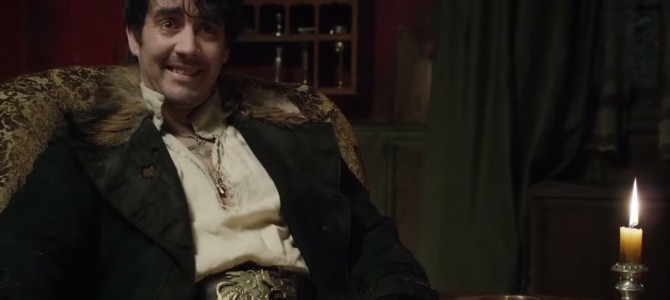
Before you accept the immortal kiss of the vampire, ask yourself one question: Do I want to be doing the dishes for the rest of eternity?
“What We Do in the Shadows” is a charming mockumentary from writer-director team Jemaine Clement and Taika Waititi, exploring the unglamorous side of vampire life (or death) in New Zealand. It perfectly mimics reality-show conventions, like the self-narration with which the film opens: “So it’s six in the evening, which is when I wake up. This is always the really scary part for me,” the foppish Viago (also played by Waititi) confides to the camera as he checks to see if the sun is finally down.
Viago—who’s sweet and responsible, in a bloodthirsty sort of way—rouses his undead flatmates and calls all of them to a meeting to discuss “flat responsibilities.” Each of the vampires gets a reductive personality summary, as a chyron gives his age: Deacon (Jonathan Brugh), 183 years old, is “just, like, the young bad boy of the group.” The vaguely Eastern European Vladislav (Clement) is a ladykiller in more ways than one. And Petyr (Ben Fransham) is excused from the flat meeting because he is a Nosferatu-looking horror whose sole activities are killing and glaring.
Viago scolds the rebellious Deacon: “You have not done the dishes for five years!” I share a house with nine other people, most of them undergraduates, so I frequently find myself muttering, These are the housemates given to me for my sanctification. I was howling with laughter during Viago’s disastrous “flat meeting.”
Please Like Me
The rest of the film has the same easy, crowd-pleasing sense of humor. Vampires try to get into clubs (they have to be invited), struggle to put together the perfect outfit without a reflection, and take safety tips from hypnotized police officers. There are some surprisingly dark moments—one of the vampires casually reveals he was a Nazi, while another recalls, “When I first became a vampire… I was known for torturing people.” As an explanation, he offers: “I was in a bad place.”
“What We Do” plays with the idea that even vampires—who can’t be seen in mirrors and shun the light of day—just want to be seen and known for who they really are. And it suggests that few of us have any idea how badly we’d come off if we did get a chance to show the world our side of the story. But this isn’t a scathing satire of selfie-generation subculture documentaries; it’s a fundamentally light comedy about fanged fish out of water. A new young vampire tries to teach his comrades about technology, and they don’t quite grasp it: “I lost a really nice silk scarf in… about 1912,” one says, and the other urges, “Well, Google it!”
There are some great moments and ideas: The vampires play fetch with werewolves. A vampire wallows in self-pity by watching YouTube videos of sunrises. The movie is not above puns, like the werewolves who rebuke foul language with, “We’re werewolves—not swearwolves.”
The vampires are petty, manipulative, obsessed with sex and status: Everyman, in other words, with a tendency to go ultraviolent on their houseguests.
Surviving Life After Death
The most unexpected element of “What We Do” is the way its subject matter seems to force the film to take on themes of regret and exposure of failure. How do you live with the things you’ve done, when you know you’ll have to live with yourself forever? The documentary crew sometimes catches the vampires in lies or cheap self-justifications. To the extent that “What We Do” has any coherent message on these topics, it suggests that we learn to live with ourselves by lowering our expectations and accepting the moral grubbiness of our (after)lives. Yes, sure, Petyr is a terrifying monster, but we’ve known him for so long!
There’s a moment when Nick (Cori Gonzalez-Macuer), the jackass new vampire, sparks a chain of events which leads to the final, real, no-takebacks death of one of the original vampire housemates. How do these fearsome creatures of the night punish one who has sinned against their own?
I don’t want to give it away, so I’ll just say that the punishment scene is ridiculous. It’s a weirdly perfect, pathetic encapsulation of the vampires’ emotional survival strategy: They accept everything, postpone everything. They can’t escape one another—there’s a fun little subplot about “The Beast,” the ancient archnemesis of one of the housemates—so they have to learn to get along.
But I don’t want to read too much into what’s essentially a good-natured light comedy. The audience with whom I saw “What We Do” enjoyed itself immensely, and I think you will too. And it will make you very grateful, as you go home to take out the garbage and wonder who has stolen all the forks and why, that this too shall pass.








